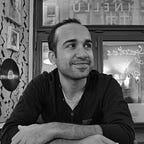Reflection is often defined as serious or focussed thought or consideration, as differentiated from mind-wandering and ruminating — both of which involve thinking but are more random or focussed but painful or circular. Reflection on the other hand is directed attention to a particular topic to see it for what is and to explore it.
As adult human beings, reflection is often how we set ourselves straight. Anything remarkable that happens to us, whether positive or not, triggers thoughts about it, and may even need dedicated reflection and integration of those thoughts.
As you can imagine there are moments where thinking can get difficult, uncontrollable, specially if the topics carry heavy emotions with them. Luckily there are way to organise our thinking, and to reflect well.
One of the best reflection tools I have learnt came indirectly from this talk by Tony Robbins, a renowned coach and trainer of coaches — he has tons of material on the internet on how to live better, not just for one self but also in service to humanity. Check him out..
Here’s what I learnt from Tony: Take any matter, something that happened, you got a job or you lost a job, Covid happened and your plans didn’t work out, but then something else happened that you dared not dream of.. anything, and ask yourself these three questions:
- What happened?
- What does it mean to me?
- What am I going to do about it?
These are powerful questions, each can lead us into significant inquiries into ourselves. So to get the best out of our reflections, it is important to ask the questions one by one and take your time to answer them as honestly as you can. Let’s say you chose your topic for reflection, let’s work it out together:
What happened? What really happened?
See if you can almost narrate this story from the point of view of an uninvolved third person.. I say almost because we are talking about your experience so the story will always be your subjective story, but we mainly want to be as factual as possible.. Once you can say what happened, we can move forward and ask the second question..
What does it mean to me?
This is where your emotional experience and impact of the situation comes into the picture. By separating this question from the first you have now carved out a dedicated space for your feelings and emotions. This is the space for you to fully and truly feel what that situation meant to you and what impact it had on you. Whether you were happy, thankful, angry, sad, hurt, elated, in love or heartbroken — those feelings are what give meaning to any event that happens to you, and it is a very important part of reflection to fully feel and give your emotions the acknowledgement that they need.
This paves the way to integration, which is facilitated by the 3rd and the last question..
What are you going to do about it?
Asking this question is as important for positive events as it is for any difficult, unresolved, or problematic situations. What you are looking for are answers that help you shape your response, allowing you to move forward. “I am going to talk to my friend or my boss or my colleague about this”, “I am going to apologise”, or “I am going to say thank you”, or, or, or..
Being grateful, or expressing yourself brings you to closure, and to an integrated state of being, even if there may be work still to do about the issue.
—
I’ve begun to appreciate these question more and more because they get you to not just notice what happened objectively and subjectively, but also to get to some form of closure and to move forward with it.
So this end of the year, as you reflect, give these three questions a try:
- What happened?
- What does it mean to me?
- What am I going to do about it?
I leave you today with some words of wisdom by Jordan B. Peterson:
“You deserve some respect. You are important to other people, as much as to yourself. You have some vital role to play in the unfolding destiny of the world. You are, therefore, morally obliged to take care of yourself. You should take care of, help and be good to yourself the same way you would take care of, help and be good to someone you loved and valued.”
—
P.S. I have purposefully not added any examples of my own, so that your exploration with these questions remains fully yours. As a coach, I do realise that support and dialogue is often helpful, so if you would like to talk about these questions, my experience with them, or any other personal growth/related topics, you can always find me on balach.de
